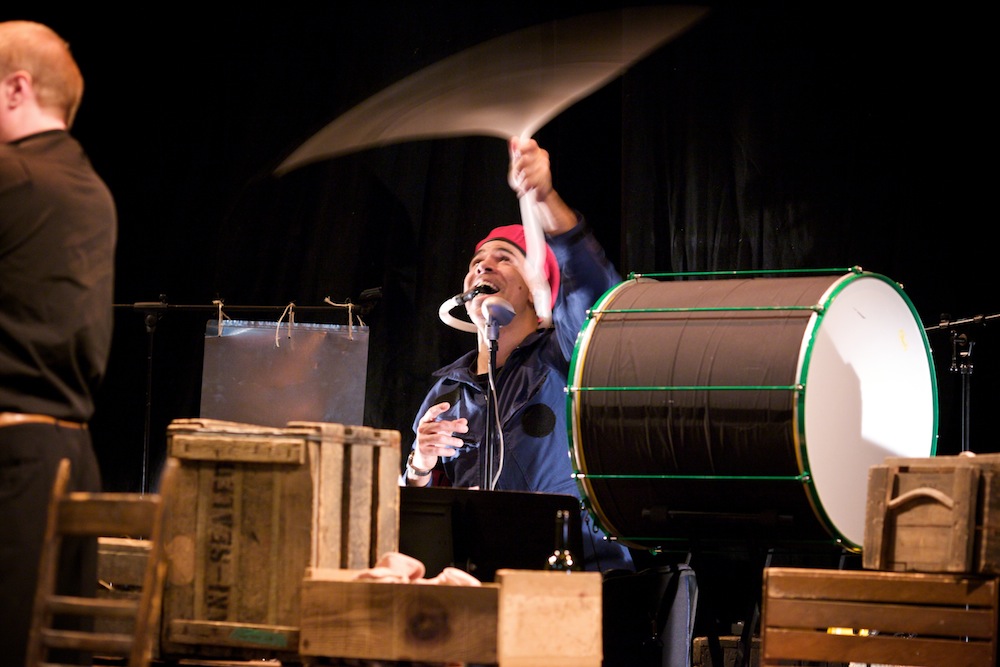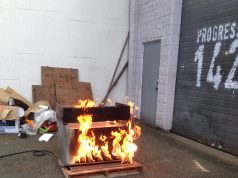
Last week playwright Tara Beagan and I got into an intriguing conversation on Facebook with Obsidian Theatre Artistic Director Philip Akin about barriers to theatre artists talking to each other about their work. There are numerous pitfalls to this in terms of alienating one’s peers for a myriad of reasons, but we all agreed that we ought to be better at talking to eachother about our work than we were.
A few days later, Tara, who once wrote a whole play with Praxis, texted me with some questions after a performance of our latest work, Rifles. Would I be interested in the sort of public critique of my own plays that only days ago I had lauded as necessary? Could I find a third person who had seen the performance on the same occasion to participate, so it would be more of a discussion?
This seemed a good and fair question to ask and so I agreed and sought out Emma Mackenzie Hillier, current Nightswimming Theatre Metcalf Foundation Dramaturgy Intern, who had also seen the show the same evening as Tara as well as the first version I directed as a Shaw Festival Director’s Project.
She agreed – and so we all gathered round our personal Facebook hearths, the evening after the play had closed, to have the discussion that follows below. I was going to edit it down, but I started to feel like what is awkward about this format was also interesting, so the conversation is preserved in whole:
-
- Conversation started Monday
- Hey is this this just like gchat?
- Oh! Hello!
- seems like it’ll work
- well it is where it all started
- Perfect setting.
- true!
- Tara! I had the pleasure of hearing you speak at the LMDA Conference this past year and was quite moved by your speech. It’s a pleasure to e-meet you here.
- aw, thank you. very kind of you to say.
- wheeler, can i tell you how nolan had us do our critiques at nepa, or should we just free for all?
- Michael Wheeler
- so yes, i think we’ve all agreed to be here and talk about Rifles in a critical but constructive way.
- or maybe you have a plan… i’m bossy.
- i am a bit nervous bit also intrigued
- ditto!
- i am much more into it now that it has closed.
- it does make the gut jump a little. honesty. eep!
- “closed”
- I’m interested by what we mean by “critiquing” – I think we view that word with a lot of negativity.
- fair enough. though i wish we were dropping bravery bombs on each other DURING runs so we could make changes if we wanted to.
- hahaha… unless it’s an Equity show, in which case the Director isn’t allowed to!
- so right, emma.
- we’re set up to settle.
- i like to work on a show past opening if cast is into it.
- That would be nice. It would certainly open the channels for collaboration in a bigger way.
- definitely.
- So… how do we want to start?
- my beloved friend pj prudat will haunt directors for notes all the live long run.
- But public acting notes-mid run would be weird. There are alot of trust issues between a director and actor that would come up.
- yvette nolan had us circle up and talk around a few main points…
- curation/context. the script. the design elements. the casting/the cast. the directing.
- difficult to separate, but painfully fun to try.
- Oh… that’s fantastic.
- yes please. curation context 1st?
- lets do directing last
- I think that’s a good place to start. Especially for me since I think that’s where most of my questions are.
- curation/context is big and small: curation of the play by the producing companies, context in the theatrical ecology, context within an actor’s body of work, etc.
- hahaha – I might have to jet by then… in which case it would be down to Tara to chat with you.
- cool. emma, you spark us with a question!
- awesome!
- So, Michael, I’m curious about your choice to pick a play that is so political in its reference to economics in relation to war and why you feel that is an important play to put on our stages now?
- Well I guess the reason I picked it more than anything is that it is anomalous for Brecht in that it is not like the rest of Epic Theatre; He called it and Aristotelean Empathy drama. Buut even so – you can’t escape Marxist underpinnings and primacy of economics in that paradigm.
- did praxis commission nicholas to do the adaptation?
- In terms of why *now* – hmm whether to fight or use non violence to achieve social justice seems an eternal question for humanity.
- @Tara – i guess. Commission makes me think we paid up fornt- which we did not. He is one of the shares in the box office split from Next Stage.
- Well… I don’t have a response to that answer, really.
- Do you want to talk about what did an didn’t speak to you about these themes as we presented them?
- I wish I had a great smart response but I don’t…
- Sure.
- so, what was it that brought the pairing to want to stage something that a known playwright wrote as a work of fiction rather than as theatre?
- funny time lags make us all seem so awkward
- no brecht wrote it as theatre. nicolas worked from a literal translation which we DID commission. guess i should have clarified.
- i am naturally awkward
- we still have 20 minutes we want to adapt from Orwell and include. it is non-fiction
- What is it about the Orwell character that you think will enrich the current text?
- he is repped in the play you saw by British Soldier Eric Blair -Orwell’s actual name.
- Played by Philip Graeme.
- (he was lovely)
Talk to me about what didn’t quite work for both of you
- Tara Beagan
- is it fair to say that character as it stands was underdeveloped? due to time constraints and such? related: how did you find the time limit?
- it is quite fair. i think to say that
- Tara Beagan
- cool. cuz i didn’t understand why he existed.
- I found that he opened up the world to me, a little.
- intriguing. will you say more?
- Yes – well – in Brecht’s version he comes in ang goes out. he is onstage for maybe 2 minutes. in our version he is there for an hour
- In total honesty, I’ve seen two productions of Rifles directed by Michael. The first didn’t have the Orwell character on stage for the whole show.
- In this production I really appreciated his presence as it opened up the war to me as something bigger than the town.
- As an outsider, a Brit, he doesn’t belong to Spain. And by being there, wounded, he was a constant reminder of the danger that we know is present… but moreso.
- smart, emma. i see that.
- i understand intellectually, but i guess i didn’t feel that. in the show. he felt very much like the others
- I appreciate this. and im sure Nicolas would too, as I think that would gel with his goals for the character – but I still would like him to be more cohesive.
- honestly, though, i often have troubles following war stories.
- Ditto.
- Which was something else I appreciated in this adaptation of the play.
- Because Brecht described this as Aristotelean I have been brushing up on what that means in terms of drama – a biggie is that there are no extraneous elements. Cohesive.
- The first round, as Michael pointed out to me a few days ago, at Shaw had a lot of different Generals who were oppressing (read: mass murdering) the people of Spain. This edition had only one which simplified things considerably.
- Im not sure that the Orwell element we have inserted is cohesive yet – but that’s why we’re planning another workshop.
- i did like seeing mostly The People, for sure.
- huh. can you expand on that?
- wheeler, i have a question that andy wondered. can i chuck it in the ring?
- fo sho
- Tara Beagan
- yes – The People.
- it was in a home, with a woman and her son and her bro. the soldier-type had little to no voice. i know pedro is fighting, but he felt of the grassroots.
- priests always creep me out, so i wouldn’t call him one of The People. i can imagine seeing generals would be weird in this intimate setting.
- andy moro wondered this – for a fella so moved and interested in Idle No More, why did you go as far away from home as old conflicts in spain?
- well. its a good point that we need not look to europe or WWII to find examples of genocide or Fascism
- and of course we all know that in specificity we find universalities.
- i think this brings my mind to casting. may we?
- yeah. i have some things on this.
- my biggest thing is that i didn’t believe any of those people were poor.
- (sorry if that stung.)
- no that is interesting. does not sting. continue.
- Oh that’s interesting. Yep. I wanna know more too
- i actually realized it just now. people who don ‘t have a lot of money never call themselves poor.
- Ah!
- Not to simply disagree with you, but I think I disagree with you Tara.
- oh, exciting!
- Perhaps it depends on the level of poor you’re talking about.
- Really? I think I agree with Tara.
- But, and this is all drawn from experience… so not specific research, but I think people who are on the bottom of the socio-economic pile do say it.
- Maybe not as much, or as often, as Theresa.
- When Brecht has his character’s say “We’re Poor” – i hear the propagandist for a moment and we leave psychological realism.
- Right!
- Which I think is where a lot of my difficulties with the play come from.
- in my experience, there is an understanding of “they are rich” but walking in the truth of “we are poor” is not a thing.
- good point, wheeler. we hear artist privilege.
- yeah – getting by, maybe down on luck.
- Whenever the line “we’re poor” came to the surface, I disconnected from the argument. Except for its first use, every time those words were used after I was taken out of the very “realist” (with a musician on stage) world that I was watching. I felt as though the propaganda was getting in the way of the story being told.
- As an audience member, if you show me propaganda I turn off. If you show me heart break and loss I turn … on?
- @Tara, that’s a fair point and I think I understand better where you’re coming from.
- me, too, emma. i need to love someone on that stage. or something.
- hahaha… maybe just a little bit?
- I loved Theresa… I had a lot of compassion for her. She’s a very strong, beautiful, and stoic character. But whenever “I’m poor” was a response, the stoicism left for at least a fleeting moment.
- did brecht always do the brechtian thing of pointing out that the play is a play?
- so brecht actually wrote this as propaganda so that brits would put it on to pressure england to interfere in the war.
- its always propaganda – even when it’s realism.
- bless his little red boots.
- Yeah… that sounds pretty Brechtian.
- was there anyone in the cast with mediterranean roots?
- he almost always did the pointing out thing – except it would be possible to do this one without that if you for give the speeches on class consciousness and the role of the poor/proletariat.
- (sorry i’m not going to bother seeking out the proper spelling of mediterra etc.)
- @Tara – no there was not – but this was not for want of trying.
- it felt WASP-y to me. straight up. very talented actors, but quite WASP-y.
- I have a whole other blog post about diverse casting, and indie theatre, because it has some unique challenges.
- I think… actually… if I do have a critique it was about the amount of blonde hair and blue eyes on that sage.
- *stage
- It does! And I look forward to the post.
- i think you may be biased buy the super-waspy image aislinn and i make on your program cause of how fringe did the marketing.
- I was curious about that choice as well, actually.
- I take it they were focusing more on the creators of the piece?
- i wanted more blood in the mouth and fire in the bellies. antonio banderas would look great in a long black frock. all of the frocks.
- WE DID NOT CHOOSE OUR PICTURE TO BE THERE!
- ON PROGRAM
- i loved that it was you & aislinn. you are undercelebrated, both.
- (sorry just wanted to clarify)
- i did not enjoy that.
- im supposed to be a ninja
- … I think you’re too tall to be a ninja.
- how’s that for a critique?
- don’t lie, wheeler. actor.
- only when you write them.
- ha.
- okay, why so much stuff to the set?
- Its not that much stuff, it is just visually busy.
- ie the major furniture but then like 26 crates
- And centre stage sits Beau.
- it felt like lots of stuff that didn’t serve the telling. partly because that woman’s home is no doubt spotless and fit as a ship.
- beau was awesome. made me want to spend a whole day talking into a bucket.
- I think a critique should always include positive elements and I wanted to mention that I really enjoyed and appreciated the sound design / soundscape (sorry, this is off topic)
- yes, we bought into his presence immediately. and it was impressive how you guys disembodied franco, but beau was RIGHT THERE.
- YES!
- I’m really sorry to have to do this, but I have to dash. I have a production meeting I need to get too
- nice to meet you!
- ditto!
- Michael, thank you for asking me to take part!
- hmm. i know what you mean about it should be clean. a big design challenge is how do you reasonably hide 5 realistic rifles in a festival setting. we had to create something big for them to be reasonably camouflaged by. in a diff version would love to put them under floorboards. then lots could change.
- ok this was great guys. can we call it a successful 1 hr online critique?
- i’d love to see them in plain view. the whole time. hanging, like the crucifix.
- huh. that very brechtian….
- I will send you guys my edits to the convo.
- yep. if you’re saturated, as you have every right the day after “closing”, we should sign off as well.
- I look forward to reading your article!
- i don’t mean to be entirely negative. i’m only saying because i feel there is a lot to make much muchier.
- Michael Wheeler
- Tara thanks again for suggesting. Its great









